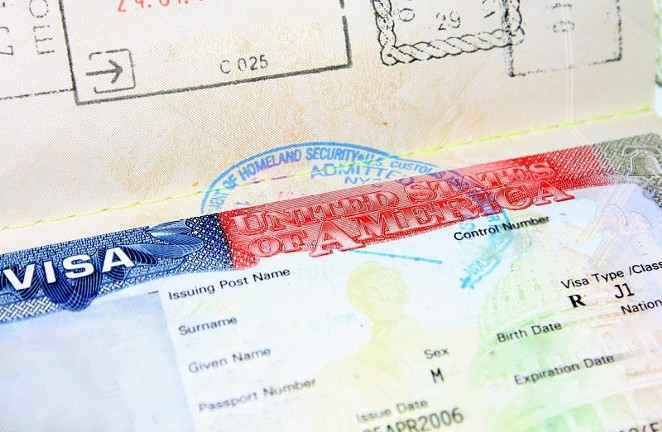Coronavirus is affecting people across our city in a multitude of ways.
When the Department of State issued a Do Not Travel advisory on Mar. 19, it left a direct impact on people in the United States who hold a J-1 visa.
A J-1 visa allows people to participate in work- and study-based exchange programs in the United States. Participants pay a fee to obtain the visa and have a program sponsor to help them while they’re here.
Two common programs in Savannah are for hospitality jobs and for Au Pair in America.
An au pair is a young international visitor who comes to the U.S. to live with an American family and take care of their children while also experiencing a new culture and often learning English.
The uncertainty with the J-1 visas has disrupted daily life for Liza Neiderwagner, an Au Pair host mom whose family has used the program for childcare since 2012.
Neiderwagner currently has an au pair from Peru and was waiting on the arrival of another au pair from Brazil.
“We had matched with her and she was going to come at the end of April,” she recalls. “Maybe a couple weeks ago they said, ‘Oh, her arrival date has been postponed to May 11.’”
Neiderwagner had a Skype call with their au pair to let her know they were still interested in having her come, but a few days later, those plans changed.
“She let us know that she was notified that the visa appointments were being canceled indefinitely,” says Neiderwagner. “That’s the thing—it wasn’t a time frame, it was just indefinitely.”
Neiderwagner reasons that one factor for postponing arrivals is because the au pairs gather in New York City before flying to their new host families’ homes, and New York was one of the first states to be affected by coronavirus.
Molly Hayden serves as the local community counselor for Au Pair in America and reports that they received communication from the Department of State on Mar. 13 that advised suspension of arrivals for 60 days.
“Au Pair in America, as a program designated by the Department of State, made the decision to follow this guidance to ensure the health and safety of all participants,” says Hayden, “as well as the fact that we see this global concern as something that goes beyond business.”
Hayden shares that Au Pair in America is providing resources, as well as advice, to both their host families and the au pairs.
“We’re currently focused on supporting all participants, meaning staying in contact with host families and au pairs, and providing clear and frequent communication regarding the impact of current travel warnings and the recent pause by the Department of State,” says Hayden.
“We’re doing our best to provide convenient and effective solutions while continuing to adhere to the Department of State Exchange Visitor Program’s au pair regulations.”
Au Pair in America is setting an example for clear communication during an unclear time, but the same can’t always be said for other organizations.
Some hotels in downtown Savannah use hospitality agencies to staff their properties with J-1 visa holders. I spoke to an employee of one such hotel on condition of anonymity because they have extensive knowledge of the situation regarding employees with J-1 visas and feared reprisal for speaking out.
At this hotel, the J-1 visa employees were contacted by the HR department and offered the opportunity to terminate their program on Mar. 16. None of them took the offer, but they were contacted the next day by their program sponsor, informing them that their program had been canceled.
“These kids are paying $5,000 after the conversion rate to participate in this program. If they’re to return home, they cannot come back for several months and have to refile,” says the employee.
“They have leases in their names, they’ve been here for some time. It’s my understanding that some countries have already stopped travel without Trump’s travel ban to Europe, so some of these kids cannot go home.”
Per the Department of State’s website, each country has different levels of travel restrictions subject to frequent change in such a fluid environment.
I spoke with one J-1 visa holder whose country’s borders were still open, but if they returned, they’d be subject to a two-week quarantine period.
Other people in the program were being advised to return to a country whose borders had since closed.
That J-1 visa holder says of their sponsor, “They didn’t say anything. ‘We recommend you to go home. If you don’t go home, be ready financially.’ That’s all they said.”
“There’s no cash inflow, they were not bought out at all, they were not given the opportunity to transfer to any other property or state like would normally be the case, and there is no communication on next steps,” says the employee.
At this hotel, the J-1 visa holders work enough hours to be considered full-time employees, are given Social Security numbers, and have health insurance, yet they’re not eligible for unemployment, according to their HR department.
Throw in the fact that many are not all fluent in English, and it’s clear to see why this situation is hard for them to navigate.
“There’s just a serious failing in the security net,” says the employee.
“What we’re learning is you shouldn’t be able to do this stuff to begin with. We should have stricter rules in place for why people aren’t full-time salary.”
Each J-1 employee at this hotel are having to figure out their own plans with very little help from their program sponsor.
What’s so frustrating about this situation is its uncertainty. We’re in the middle of a global pandemic, the likes of which nobody living has ever experienced, and that fact is not lost on any of the four people I interviewed.
But even amid fear and confusion, there can be clear steps taken by any organization, particularly those dealing with visas, to make its members feel safer.
Per the Department of State’s website, program sponsors “should have a plan in place in the event of a natural disaster or natural emergency,” which includes providing information and assistance to the program’s participants.

























